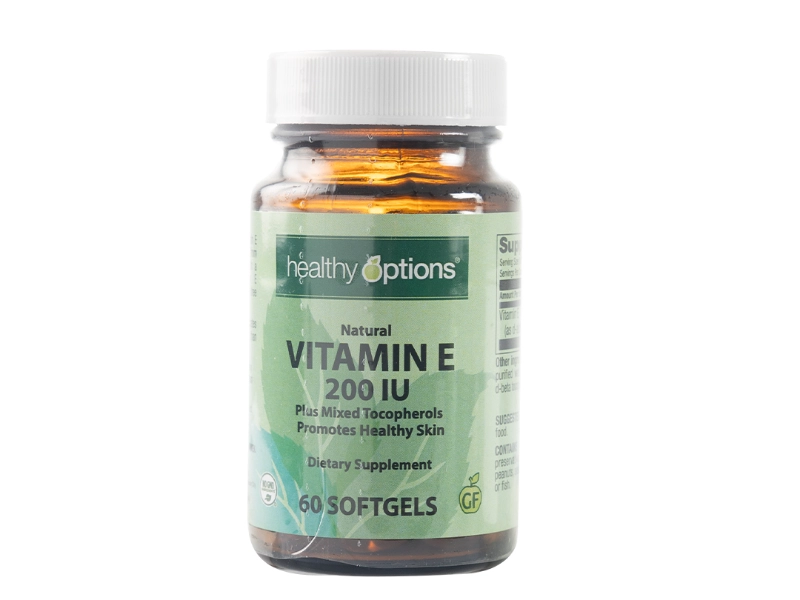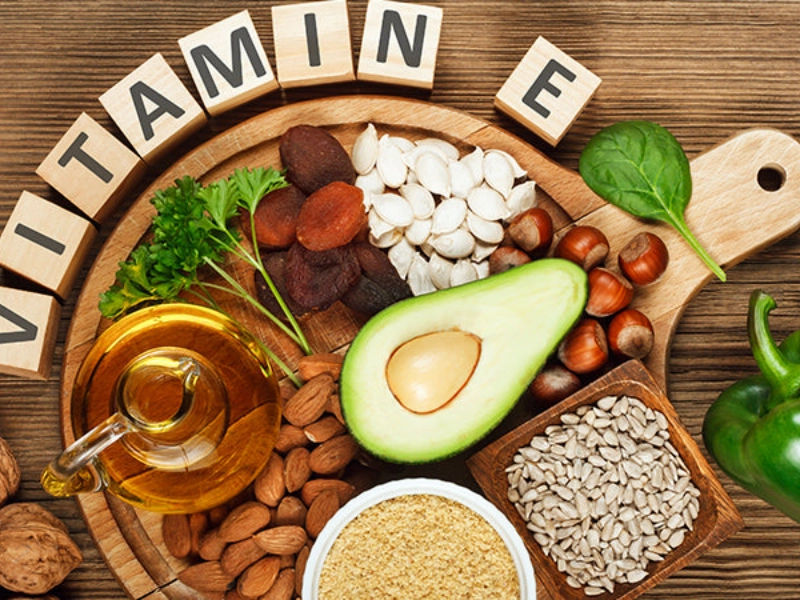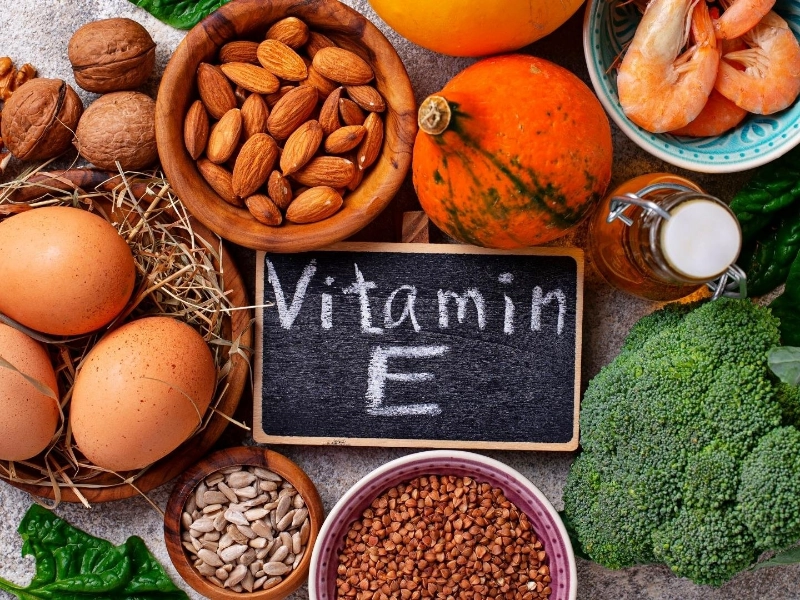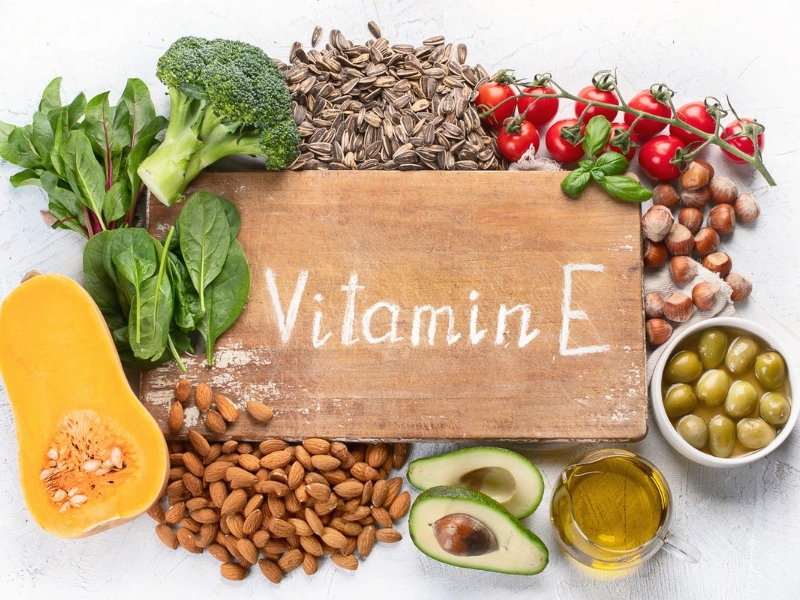Maintaining general health depends critically on vitamin E, an essential component with strong antioxidant action. This fat-soluble vitamin shields cells against oxidative stress brought on by free radicals, which might cause a number of health problems. Knowing the advantages of vitamin E helps people to make wise food decisions that advance wellness. The antioxidant qualities of vitamin E, its origins, health advantages, and function in disease prevention are discussed in this paper.

 Many foods contain vitamin E, hence including it into a balanced diet is really simple. With alpha-tocopherol the most physiologically active form of vitamin E, tocopherols and tocotrienols are the main forms found in humans. Nuts, seeds, vegetable oils, and green leafy vegetables are among rich sources of vitamin E in diet.
Among the finest sources of vitamin E are almonds, sunflower seeds, hazelnuts, and spinach. These foods give additional vital elements such good fats, fibre, and vitamins in addition to vitamin E. Including several of these foods in your diet can help guarantee enough vitamin E consumption and support general health.
There are pills for those who find it difficult to receive enough vitamin E from a diet by itself. Before beginning any supplements, nevertheless, it is advisable to see a healthcare professional since too high consumption can have negative effects.
Many foods contain vitamin E, hence including it into a balanced diet is really simple. With alpha-tocopherol the most physiologically active form of vitamin E, tocopherols and tocotrienols are the main forms found in humans. Nuts, seeds, vegetable oils, and green leafy vegetables are among rich sources of vitamin E in diet.
Among the finest sources of vitamin E are almonds, sunflower seeds, hazelnuts, and spinach. These foods give additional vital elements such good fats, fibre, and vitamins in addition to vitamin E. Including several of these foods in your diet can help guarantee enough vitamin E consumption and support general health.
There are pills for those who find it difficult to receive enough vitamin E from a diet by itself. Before beginning any supplements, nevertheless, it is advisable to see a healthcare professional since too high consumption can have negative effects.
 Vitamin E has health advantages beyond only its antioxidant qualities. Studies have indicated that this vitamin is important for immune system, skin, and eye health as well as for Vitamin E is an antioxidant, therefore strengthening the body's capacity to fight infections and diseases by helping immune cells to resist oxidative damage.
Vitamin E's moisturising and healing qualities make it a common ingredient in skincare products when considering skin health. It maintains the skin's natural barrier action and helps guard against UV damage. Furthermore, vitamin E could help to improve general skin condition and help scars to fade.
By shielding the eyes from oxidative stress—which can cause cataracts and age-related macular degeneration (AMD)— vitamin E also promotes eye health. Studies indicate that enough vitamin E intake can reduce the likelihood of acquiring these diseases, so this nutrient is quite important for preserving healthy vision as we grow older.
Vitamin E has health advantages beyond only its antioxidant qualities. Studies have indicated that this vitamin is important for immune system, skin, and eye health as well as for Vitamin E is an antioxidant, therefore strengthening the body's capacity to fight infections and diseases by helping immune cells to resist oxidative damage.
Vitamin E's moisturising and healing qualities make it a common ingredient in skincare products when considering skin health. It maintains the skin's natural barrier action and helps guard against UV damage. Furthermore, vitamin E could help to improve general skin condition and help scars to fade.
By shielding the eyes from oxidative stress—which can cause cataracts and age-related macular degeneration (AMD)— vitamin E also promotes eye health. Studies indicate that enough vitamin E intake can reduce the likelihood of acquiring these diseases, so this nutrient is quite important for preserving healthy vision as we grow older.
 Reduced risk of many chronic diseases has been connected to the antioxidant qualities of vitamin E. Studies show that by reducing the oxidation of LDL cholesterol, a main component in the development of atherosclerosis, enough vitamin E intake may reduce the risk of heart disease. Vitamin E supports general cardiovascular health by lowering oxidative stress and helps to preserve normal blood vessels.
Furthermore under investigation is vitamin E's possible function in cancer prevention. Higher vitamin E intake has been linked, some studies find, to a reduced risk of some malignancies, including breast and prostate cancer. Although a clear correlation is still to be shown by more research, vitamin E's antioxidant qualities could help to explain its preventive effects against cancer formation.
Reduced risk of many chronic diseases has been connected to the antioxidant qualities of vitamin E. Studies show that by reducing the oxidation of LDL cholesterol, a main component in the development of atherosclerosis, enough vitamin E intake may reduce the risk of heart disease. Vitamin E supports general cardiovascular health by lowering oxidative stress and helps to preserve normal blood vessels.
Furthermore under investigation is vitamin E's possible function in cancer prevention. Higher vitamin E intake has been linked, some studies find, to a reduced risk of some malignancies, including breast and prostate cancer. Although a clear correlation is still to be shown by more research, vitamin E's antioxidant qualities could help to explain its preventive effects against cancer formation.
Including meals high in vitamin E can help you to maximise the advantages of this vitamin. Easy ways to increase your vitamin E intake are to snack on nuts and seeds, toss spinach into salads, and cook using vegetable oils. Including a range of vibrant fruits and vegetables also helps as many have additional antioxidants that cooperate with vitamin E. When thinking about supplements, it's important to pick premium items and speak with a doctor to find the right dose. Usually the best way to satisfy nutritional demands, including vitamin E, is a balanced diet high in whole foods.
Although vitamin E is vital for health, too much of it taken from supplements might have negative effects. Particularly in those on anticoagulant drugs, high levels of vitamin E might raise bleeding risk. Approach supplements carefully and give top priority to getting nutrients from food sources whenever at all feasible. People who are pregnant or have other medical concerns should also see their doctor before raising their vitamin E use. Understanding the possible hazards and advantages of vitamin E helps people to make wise decisions supporting their general health and wellness.